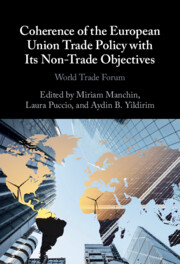Book contents
- Coherence of the European Union Trade Policy with Its Non-Trade Objectives
- Coherence of the European Union Trade Policy with Its Non-Trade Objectives
- Copyright page
- Contents
- Contributors
- Introduction
- 1 European Union Trade Policy and Non-Trade Issues
- 2 The European Union
- 3 Export Credit Agencies
- 4 The Effects of Non-Trade Provisions in Trade Agreements on Bilateral FDI
- 5 How EU Trade and Cooperation Policies Stimulated China to Go Green
- 6 The Role of Domestic Factors in the EU’s Governance of Labour Standards through Trade
- 7 EU Trade Agreements and Non-Trade Policy Objectives
- 8 Trade, the G20 and the EU
- 9 Enhancement of the European Parliament’s Monitoring for Better Coherence between Trade Policy and NTPOs
- Conclusion
- Index
Conclusion
Published online by Cambridge University Press: 19 October 2023
- Coherence of the European Union Trade Policy with Its Non-Trade Objectives
- Coherence of the European Union Trade Policy with Its Non-Trade Objectives
- Copyright page
- Contents
- Contributors
- Introduction
- 1 European Union Trade Policy and Non-Trade Issues
- 2 The European Union
- 3 Export Credit Agencies
- 4 The Effects of Non-Trade Provisions in Trade Agreements on Bilateral FDI
- 5 How EU Trade and Cooperation Policies Stimulated China to Go Green
- 6 The Role of Domestic Factors in the EU’s Governance of Labour Standards through Trade
- 7 EU Trade Agreements and Non-Trade Policy Objectives
- 8 Trade, the G20 and the EU
- 9 Enhancement of the European Parliament’s Monitoring for Better Coherence between Trade Policy and NTPOs
- Conclusion
- Index
Summary
Even though there were linkages between European Union trade policy and “values” before 2009 (in particular with the institution of dialogues under the various association agreements concluded before 2009 or via the link between development policy and trade), linking non-trade policy objectives (NTPOs) and EU values to EU trade policy has become an increasingly prominent feature. The further politization of trade policy with greater power of the Parliament, which must give its consent to the conclusion of trade agreements since the Lisbon Treaty (Article 207 Treaty on the Functioning of the European Union, TFEU), and the rising citizen concerns on the impact of some trade agreements on NTPOs – as shown by the manifestations related to the Transatlantic Trade and Investment Partnership (TTIP) and EU–Canada Comprehensive Economic and Trade Agreement (CETA) – has created more political pressure to enhance these linkages. Finally, the realization that trade can be a useful tool for achieving NTPO objectives, for example in promoting policies in line with climate change objectives, has also called for the multiplication of these trade/NTPOs linkages in bilateral, regional and multilateral engagement with third countries (using soft power via dialogues and non-binding agreements) but also for the enhancement and proper enforcement of NTPO provisions in trade agreements (moving toward a stronger hard law approach in the future). The latter is notably the main objective of the most recent European Commission Communication published in June 2022 on the power of trade partnership as tools to foster green and just economic growth.
- Type
- Chapter
- Information
- Coherence of the European Union Trade Policy with Its Non-Trade ObjectivesWorld Trade Forum, pp. 263 - 270Publisher: Cambridge University PressPrint publication year: 2023
- 1
- Cited by

